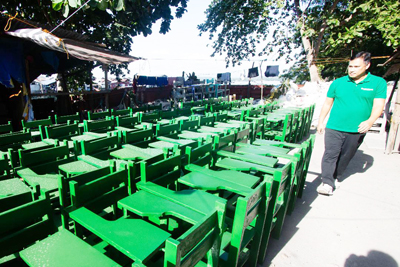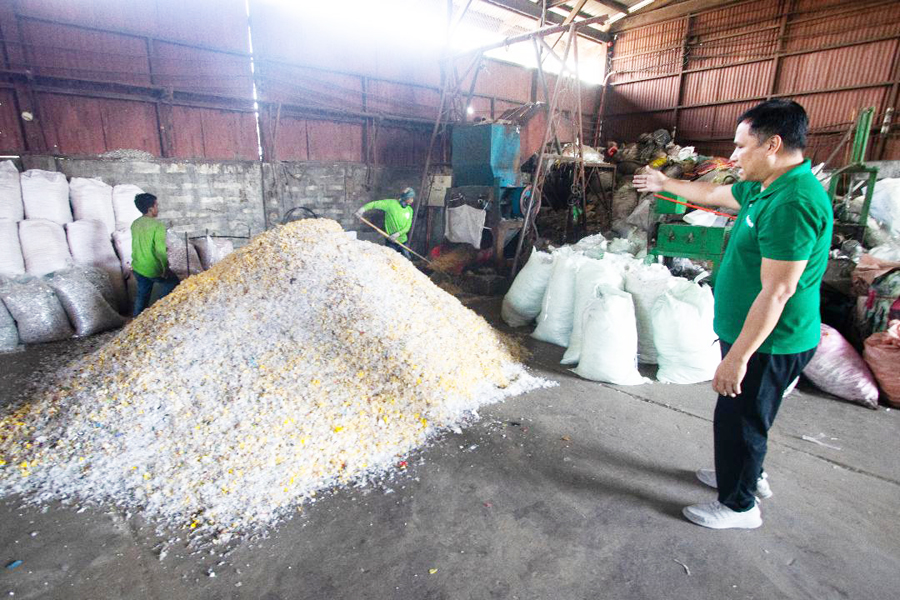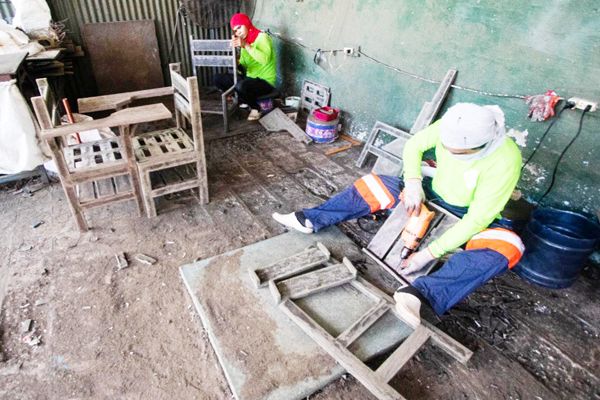Recycling firm in Davao City offers solutions to reduce wastes
DAVAO CITY – As the population grows each year, so is the solid waste problem here.

ENVIROTECH Recycling Co. CEO Engr. Winchester Lemen inspects chairs manufactured from shredded plastic wastes inside the company plant in Davao City. (Keith Bacongco)
With a population of at least 1.9 million people, this city is one of the fastest growing economies in the country.
With rapid urbanization also comes the challenge of coming up with solutions to address the rise of solid waste in this city.
Several recycling companies in this city are offering solutions to reduce biodegradable and non-biodegradable wastes that are being dumped in the sanitary landfill here.
Among them is Envirotech Recycling Co., which has been recycling plastic wastes since 2010.
Founded by Engr. Winchester Lemen, the firm hopes to prevent the surplus of wastes from polluting the rivers and the oceans.
The firm recycles Polyethylene Terephthalate (PET) bottles, candy wrappers, junk food wrappers, sacks, and other plastic wastes.
In its early years of operation, Lemen said they focused mostly on recycling PET bottles and turning them into armchairs for schools and other household furniture.
Recently, the firm started processing soft plastics such as food and even candy wrappers.

LEMEN shows shredded plastic wastes that will become chairs. (Keith Bacongco)
A single school chair, he said, is made up of 30 kilos of plastic or the equivalent of 10,000 candy wrappers or equal to 2,181 sando bags or 300 bottles of mineral water.
“These plastic wastes are just everywhere, some actually end up in our rivers and seas,” said Lemen.
Collected plastic wastes are being shredded into tiny pieces before going to the melting machine and then molded into planned by-product. "My system is actually is simple but we can produce high quality outputs," Lemen said.
Through his company, Lemen said that he aims to help address the growing plastic waste problem especially that lifespans of sanitary landfills (SLF) elsewhere are shortened.
Rising waste generation
Data from the city government showed that the projected waste generation here is expected to rise from 991 tons per day in 2019 to over 1.2 tons per day by 2027.
But the actual disposal at the SLF ranges from 700 to 800 tons per day since last year, said Committee on Environment and Natural Resources Chairman Councilor Tek Ocampo.
City officials have been saying since 2022 that the SLF here will be full by 2023.
In 2022, this city generated at least a million tons of waste, half of which are non-biodegradables. About 30 percent of these non-biodegradables are plastics, according to reports.
According to Ridge Reef, an environment consultancy group engaged in SLF construction, the law requires a five-year lifespan of SLFs based on each LGUs disposal rate.
Ridge-to-Reef Senior Partner Engr. Diego Tautho said that the bigger the disposal rate, the bigger the landfill.
Tautho added that SLFs' lifespan is usually designed for 10 years or more to surpass the five-year requirement.
However, for bigger towns or cities like here, the continuing establishment of SLF is no longer practical since more lands will be consumed for garbage disposal.
“The best way for big cities with more than 600 ton per day like Davao City is to incorporate a Waste-to-Energy facility which utilizes solid waste as fuel to produce power and reduce the volume of waste to 90 percent while 10 percent will only be disposed to landfills if there is operational WTE,” he said.
With the WTE, the seasoned landfill builder added, it prolongs the life of SLF 10 times.

A WORKER paints armchairs made of recycled plastic inside the company plant. (Keith Bacongco)
Tautho observed that the most of the SLFs that they have built for LGUs have exhausted the lifespan as designed. “And most of the wastes inside of these SLFs are plastics. But it is unavoidable that many SLFs also contain biodegradable wastes.”
Thus, he encouraged every household to practice waste segregation coupled with implementation of resource recovery initiatives in every barangay like recycling and composting.
Diverting plastic wastes
With the growing problem of plastic wastes, Lemen said he has been talking to different local government units in different parts of Mindanao to divert their recyclable plastic wastes to his recycling plant.
He added that LGUs can bring plastic wastes to his plant for recycling. "They can request to us what they want us to produce like chairs or tables and we will be giving discounts for them."
Recently, his firm started processing plastic wastes from different beverage and food companies in this city for a fee as required by the Extended Producer Responsibility (EPR) Act of 2022.
Under the law, producers are required to be environmentally responsible throughout the life cycle of a product, especially its post-consumer or end-life stage.
With the enactment of this law, it has expanded their recycling coverage to sachets, labels, laminates, and other flexible plastic packaging products, whether single layer or multi-layered with plastics or other materials, containers for beverages, food, home, personal care, cosmetic products, caps, lids, drinking straws, and tarpaulins.
People know how to religiously segregate biodegradable from non-biodegradable wastes, but the problem is that they don’t know what to do with the mixed soft plastic wastes. These are usually the neglected wastes, because junk shops have no use for them, Lemen said.
Over the years, his firm has produced tiles, pallets, bricks, pots and planters, lamps, garbage bins, canisters, picnic tables, lounging chairs, foot-disinfecting baths and foot-operated alcohol dispensers, tables, and chairs.
On its website, the firm said that they are able to recycle 60 to 90 tons of plastic wastes a month. It added that 30 tons of plastic wastes can be processed and recycled into 1,500 school chairs.
Lemen admitted that their armchairs are heavier than those made with steel and wood, he guarantees that their product is more durable.
He added that his firm does not only reduce plastic wastes but they also help save more trees.
Aside from furniture, Lemen said they are now also exploring to build a house made of plastic framework. "We offer this as an alternative to steel and lumber. It will be designed to be built for one day. This is useful in building emergency shelters in times of disasters."
“This is our little contribution to the reduction of plastic wastes in our country. Imagine where does some of these tons of plastic wastes would end up if we are not processing them?” asked Lemen as he showed tons of plastic wastes still waiting to be recycled inside his warehouse.